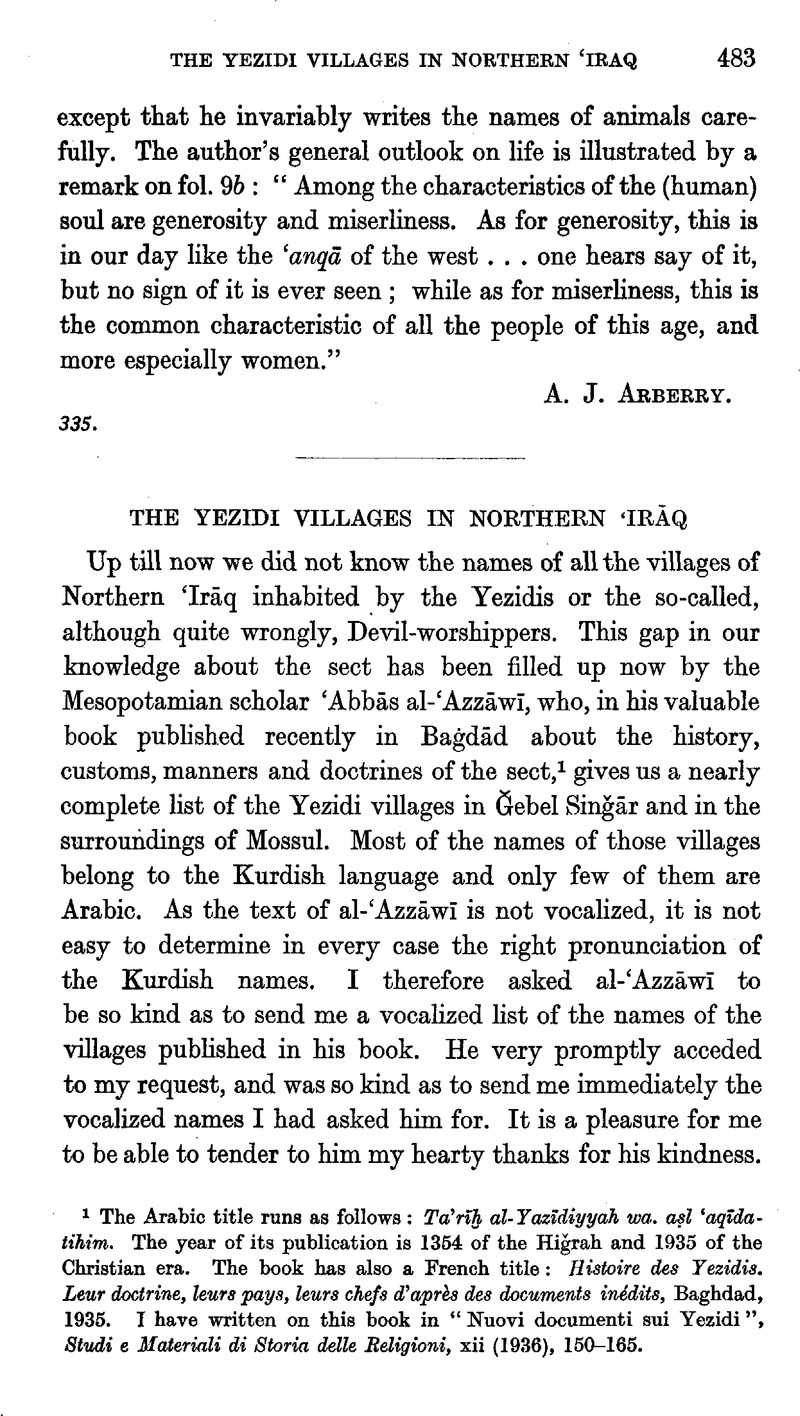Published online by Cambridge University Press: 15 March 2011

page 483 note 1 The Arabic title runs as follows: Ta'rīḫ al-Yazīdiyyah wa. aṣl 'aqīdatihim. The year of ita publication is 1354 of the Hiĝrah and 1935 of the Christian era. The book has also a French title: Histoire des Yezidis. Leur doctrine, leurs pays, leurs chefs d'après des documents inédits, Baghdad, 1935Google Scholar. I have written on this book in “Nuovi documenti sui Yezidi”, Studi e Materiali di Storia delle Religioni, xii (1936), 150–165Google Scholar.
page 484 note 1 al-'Azzāwi, loc. cit., p. 99–1·0.
page 484 note 2 On the villages of this Kurdish tribe see al-'Azzāwī, loc. cit., 9⋁.
page 484 note 3 al-'Azzāwī, loc. cit., 9ℸ.
page 484 note 3 al-'Azzāwī, loc. cit., 9⋀.
page 485 note 1 On Ḥamū Ŝarū or Ḥamū Ŝīrū see the passages of al-'Azzāwī quoted on p.ℸ|⋀, and Chol, Ismā'īl Beg, The Yazīdīs Past and present, Beirut, 1934, p. ![]() : On the table facing p.
: On the table facing p. ![]() is to be seen a picture of Ḥamū Ŝarū, “chief of the Yezidis in Ĝebel Sinĝar.”Google Scholar
is to be seen a picture of Ḥamū Ŝarū, “chief of the Yezidis in Ĝebel Sinĝar.”Google Scholar
page 485 note 2 On this tribe see al-'Azzāwi, loc. cit., 9⋀.
page 485 note 3 al-'Azzāwī, loc. cit., 9⋀
page 485 note 4 According to al-'Azzāwī, loc. cit., 9ℸ. this tribe is of Arabic origin.
page 485 note 5 This ŝeyḫ is the chief of the 'aŝīrah Hakkāriyyah and has furnished to our author much information about the Yezidis. The tribe is Kurdish, but the ŝeyḫ speaks also Arabic, al-'Azzāwī, loc. cit., 9⋁.
page 485 note 6 al-'Azzāwī, loc. cit., 9ℸ.
page 485 note 7 al-'Azzāwī, loc. cit., 9ℸ.
page 486 note 1 That is to say, of the Yezidi Amīr;r of Ĝebel Sinĝar. There is also a Yezidi Amīr of Ŝeyḫān.
page 486 note 2 al-Qādir, Ŝeyḫ 'Abd was one of the brothers of Furlani, Ŝeyh 'Adī, Testi religiosi dei Yezidi, Bologna, 1930, 17 and 38Google Scholar.
page 487 note 1 al-'Azzāawī, loc. cit., 90.
page 487 note 2 al-'Azzāawī, loc. cit., 9![]() .
.
page 487 note 2 al-'Azzāawī, loc. cit., 9ℸ.
page 488 note 1 There is a tribe called Ba'ŝīqah, its chief is Ṣādiq ibn Raŝīd. This tribe speaks Arabic, al-'Azzāwī, loc. cit., 9⋀.
page 488 note 2 The chief of the tribe Baḥzānī is a certain Ḫiḍr Āgā ibn 'Abdāl. This tribe, too, speaks Arabic, al-'Azzāwī, loc. cit., 9⋀.
page 488 note 3 Isbān seems to be the right spelling, and the first one, Īsyān, is very likely a misprint.
page 488 note 4 This village is mentioned in the subscriptions of the document presented by the Yezidis in the year 1872 to the Ottoman Government, Joseph, , AJSL, xxv (1908), 156 and 247Google Scholar.
page 488 note 5 Of the Yezidi Amīr of Ŝeyḫān.
page 488 note 6 In the above-quoted document the name is spelled Ḥuzrān Joseph, loc. cit., 155 and 247.
page 488 note 7 al-'Azzāwī, loc. cit., 9⋁, it is a Kurdish tribe; Joseph, loc. cit., 155 and 247.
page 488 note 8 Joseph, loc. cit., 155 and 247.
page 489 note 1 In this village there is a Ŝaḫṣ of the Yezidi saint Bāṭī,. Furlani, , “I santi dei Yezidi,” Orientalia, v, 70Google Scholar.
page 489 note 2 Joseph, loc. cit., 155 and 247.
page 489 note 3 Joseph, loc. cit., 156 and 247.
page 489 note 4 A makes a distinction between them.
page 489 note 5 Joseph, loc. cit., 155 and 247.
page 489 note 6 Joseph, loc. cit., 155 and 247. Ḥuzrān is not the same name.
page 489 note 7 Joseph, loc. cit., 156 and 247.
page 489 note 8 This village is omitted by B; Joseph, loc. cit., 155 and 247.
page 490 note 1 Joseph, loc. cit., 155 and 247; Furlani, loc. cit., 74.
page 490 note 2 This name is omitted by B.
page 490 note 3 In Joseph, loc. cit., 156 and 247, we read Ḫayrū, but it is not the same name.
page 490 note 4 Joseph, loc. cit., 155 and 247.
page 491 note 1 Joseph, loc. cit., 155 and 247; Furlani, loc. cit., 65, and note 2.
page 491 note 2 'Abd al-'Azīz was one of the brothers of Ŝeyḫ 'Adī. Furlani, , Testi, 38Google Scholar.